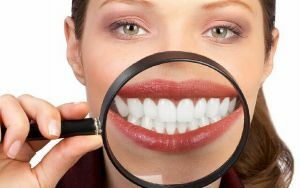 Teeth whitening is a procedure for changing the color of enamel. This is the most effective way to make your smile snow-white. The result can be achieved in a variety of ways.
Teeth whitening is a procedure for changing the color of enamel. This is the most effective way to make your smile snow-white. The result can be achieved in a variety of ways.
First of all, the bleaching procedure should be classified according to the location. It can be professional and home.
Professional bleaching is carried out in a paid clinic or specialized salon, and home-made bleaching is carried out at the expense of acquired bleaching agents, or through the use of folk methods.
Contents of
- Security issue
- Safe tooth whitening is it possible?
- Seal - an obstacle to a snow-white smile?
- Contraindications are not so little
- Asked - answer
- What if after teeth whitening?
- After the procedure: what can and can not be done?
- Carrying out the procedure for pregnancy
- Can I whiten my teeth to children?
- The opinion of the dentist
- Still can not decide?
On safety
How safe or harmful whitening of teeth directly depends on the method used. The damage to the teeth may be insignificant, or absent altogether. In this important role played by the professionalism of workers who perform the procedure of bleaching, they must be attentive to the nuances.
Some components used in bleaching are able, thanks to chemical reactions, not only to clean the plaque and to change the natural-hereditary color of the enamel  , but also to influence pigments that are important for dental health.
, but also to influence pigments that are important for dental health.
Enamel becomes loose, weak, porous due to the action of the acid. The most acute problem can be its strength.
The same hypothetical harm from whitening may depend on the personal intolerance of specific drugs and the condition of the teeth while preparing for the procedure.
That's why before choosing how to create a Hollywood smile yourself, you should definitely consult a dentist.
Do it better twice: in a paid clinic and free to be sure of the reliability of the information received, because, sadly enough, the mercantile nature of doctors at paid clinics can lead to waste of money, and can also harm your health.
Safe tooth whitening - is it possible?
Approach to the procedure with the maximum risk aversion to harm your own health is possible. The safest method is mechanical cleaning. So the teeth will not become whiter more than two tones, but you will save them from plaque and tartar formation.
Thanks to this procedure, you make your smile clean without damaging, and even benefiting.
Professional whitening compared with the use of funds at home can be called safe. Since it will be carried out under the supervision of a dentist, in case of problems, they can be solved at the initial stage.
Seal - an obstacle to a snow-white smile?
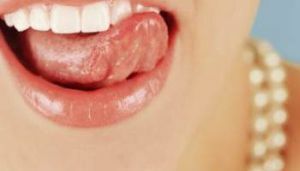 The question of whitening should be approached seriously, otherwise it is possible not only to not improve the smile, but also to spoil it. The presence of fillings during whitening can be a real problem, but not in all cases.
The question of whitening should be approached seriously, otherwise it is possible not only to not improve the smile, but also to spoil it. The presence of fillings during whitening can be a real problem, but not in all cases.
If the seal does not stand in the front rows, then it does not interfere with the procedure. It will not change its color, but it will not be noticeable with a smile.
Things are worse if the seal is located on the front tooth. It will remain the same color, enamel teeth whiten, so the teeth will differ in tone and very significantly.
The larger the surface of the filling, the less likely it is to receive a positive answer to the question "Can I perform the procedure?" If a crown is installed on the tooth, then the bleaching will not do. 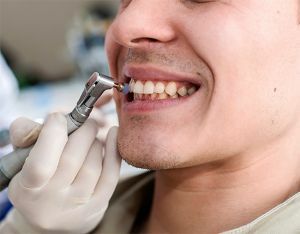
The procedure for creating a luxurious smile in people who have seals is significantly hampered and delayed.
The first thing is professional cleaning, then bleaching, after which the final stage is the restoration. It usually includes such procedure as the replacement of seals by suitable for color.
Contraindications are not so little
Since the bleaching procedure affects the health of the teeth, it has a number of contraindications. They are associated not only with the physical, but also with the psychological health of a person.
- fear of enclosed spaces, the fact is that in a confined space you have to spend a sufficient amount of time while the procedure is in progress;
- impaired mobility of the jaw;
- low threshold of tooth sensitivity;
- oral disease;
- presence of fillings and crowns on the front teeth;
- high degree of phobia to dental procedures.
If you do not pay attention to contraindications, then there is a high probability of encountering complications after the procedure. 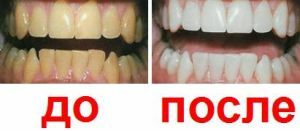
From the aesthetic side, there may be a problem of differences in the tone of the teeth and crown, which will catch your eye. An additional dental procedure will be required to replace the seals.
If to speak about the influence on health, then it is more significant:
- increase of tooth sensitivity;
- allergic reaction.
Asked - we answer
Before and after the bleaching procedure, patients face a number of questions that interest them. Consider the most popular ones:
What if after teeth whitening?
Many notice that after bleaching teeth hurt for a while. In order to get rid of unpleasant sensations, it is necessary to use the means to reduce the sensitivity of the teeth.
To find out what exactly is right for you, it is possible at a reception with a dentist. It is best to consult the same doctor who did the bleaching. After the procedure, you need to start using toothpastes for sensitive teeth.
After the procedure: what can, and why not?
After the teeth whitening procedure, oral care is needed even more carefully.
You must know what not to eat after bleaching. The first days will have to get rid of food and drinks, which will cause pain with hypersensitivity of teeth.
You can not use: coffee, berries, carbonated drinks, tea, tobacco, beets, mustard, ketchup, chocolate, dark grapes, red wine and sauce, soy sauce. All this will affect the color of the enamel.
Do not skip the teeth. Do this no less than three times a day. Brush is better to buy medium hardness, and paste to pick up for sensitive teeth.
Professional dental cleaning at the dentist once a year. This will help preserve the result of bleaching.
Carrying out the procedure for pregnancy
Maternity leave during pregnancy can be spent not only on bearing a child, but also on yourself. There is a lot of free time for cosmetic procedures, but can they be done by a future mother? 
Pregnancy is a direct contraindication to teeth whitening .
The procedure does not carry any risks for the mother or future child. But is it worth doing at a time when the body is weakened and all the forces are directed at creating a new life? In the body of a pregnant woman and so there is a lack of calcium and looseness of the enamel, and chemicals will only aggravate the situation.
If you are expecting a baby, you can clean it, which will also whiten your teeth for a couple of tones. In addition, the procedure is useful, is the prevention of the appearance of calculus and other problems of the oral cavity.
Can I whiten my teeth to children?
No one can forbid a parent to bring a child to cosmetic teeth whitening. But you must understand that the procedure entails many consequences, it is not necessary to spoil the enamel to the child from the very childhood.
Solving problems with a smile can be more humane. The child can be physically cleaned, which will relieve the plaque and other formations on the surface of the teeth.
After reaching the age of eighteen, a person will be able to decide whether a procedure is needed to help him achieve a Hollywood smile or not.
The opinion of the dentist
Bleaching is a procedure that is gaining popularity, because every person would like to have a snow-white smile. The procedure is not just cosmetic, it has a significant effect on enamel health.
If you still decide on it, then carefully approach the choice of clinic and specialist, he must have good experience in this area.
If you care about the health of your teeth, and you are not ready to cause them even minimal harm, you can undergo a physical cleansing procedure that will save you from plaque and stones. The tone of the teeth becomes lighter, it is a good prevention of diseases of the oral cavity.
Orthodontist
Still can not decide?
Let's weigh the pros and cons of teeth whitening:
Cons, of course, there are, walk over them again: 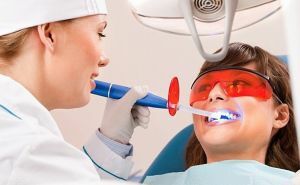
- thinning, integrity and density of the enamel;The
- procedure is quite expensive;
- if you have chosen ultraviolet whitening, then you have a high risk of getting burns of tissues;
- increased sensitivity of teeth;
- most methods of bleaching are not durable;
- need more careful oral care.
Pros, however, are mostly aesthetic in nature and consist in one weight advantage - whiteness of teeth, beautiful smile.
Before you do bleaching, weigh all the pros and cons that matter only to you.
Do a physical cleaning of the oral cavity, perhaps, its result will suit you, and you will not think about bleaching any more. Be sure to consult with a specialist in this area for individual contraindications.
Responsible approach to the selection of the clinic. Be based not only on the high level of professionalism of its employees, on the prices of services, on popularity, but also on customer feedback.
Prepare to ensure that after the procedures, oral care will need to be more thorough.
At the expense of behavior after the procedure, too, you need to consult a dentist and clarify all the nuances. If you still do bleaching, then do not forget to come for routine examinations, monitor the health of the oral cavity, solve problems as they arise.
